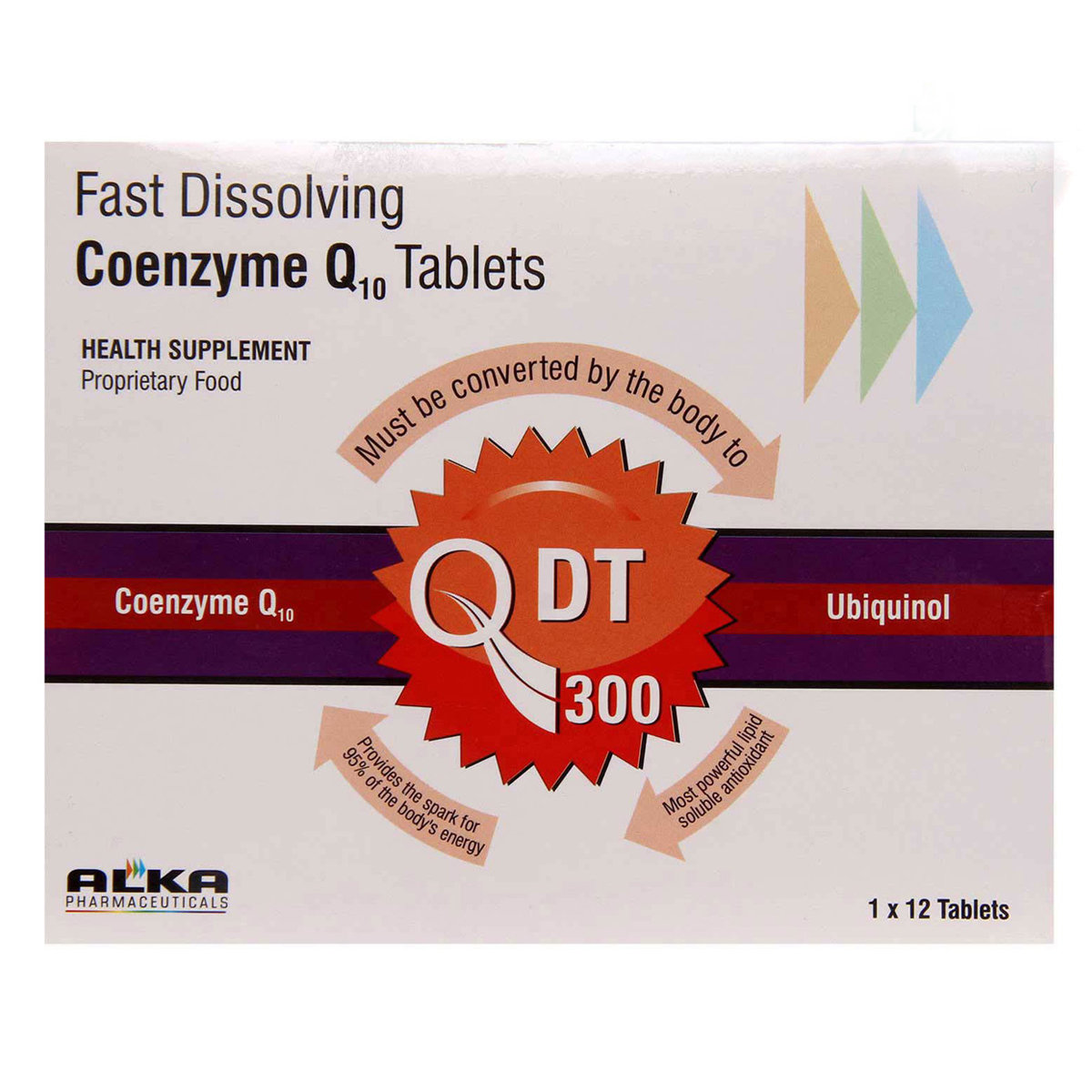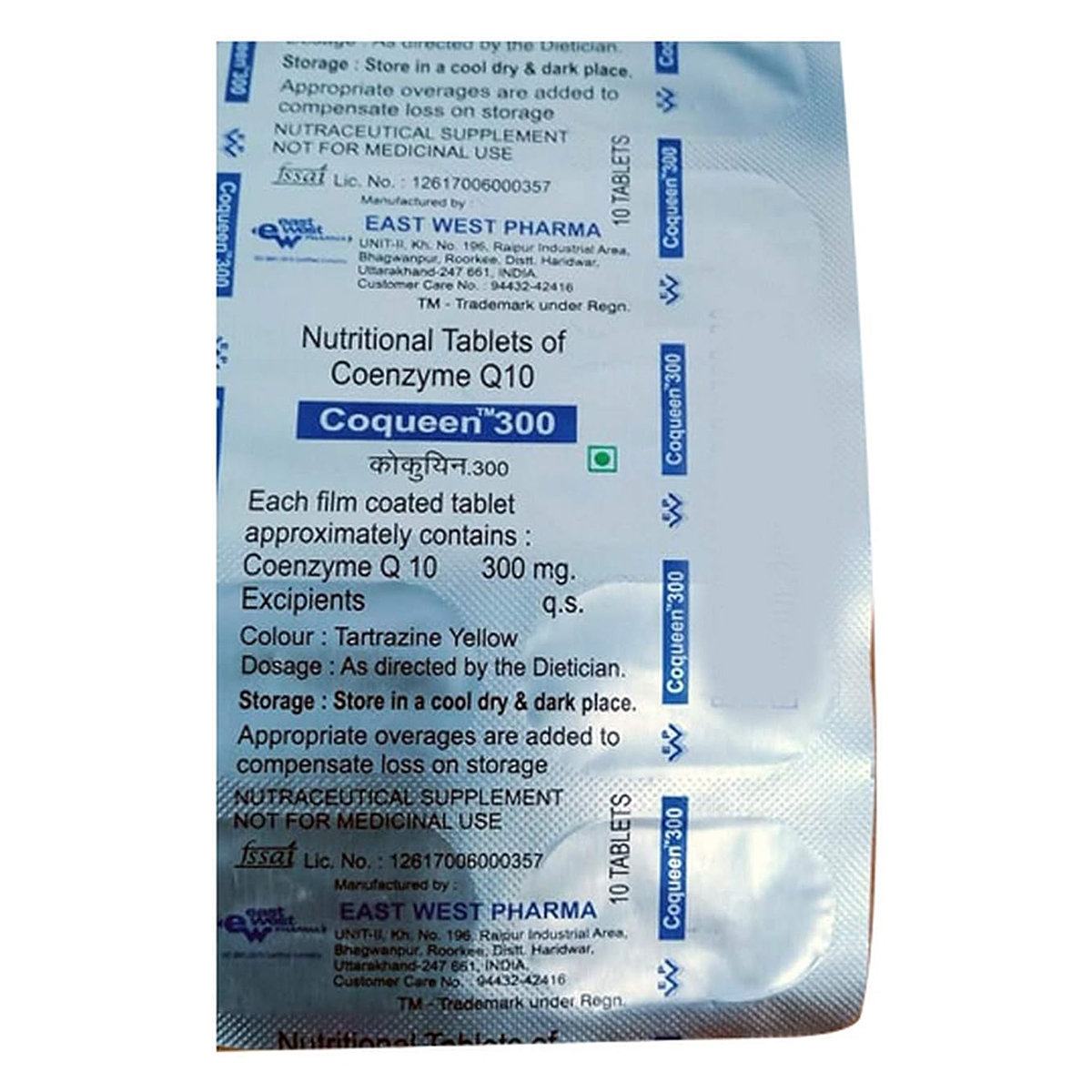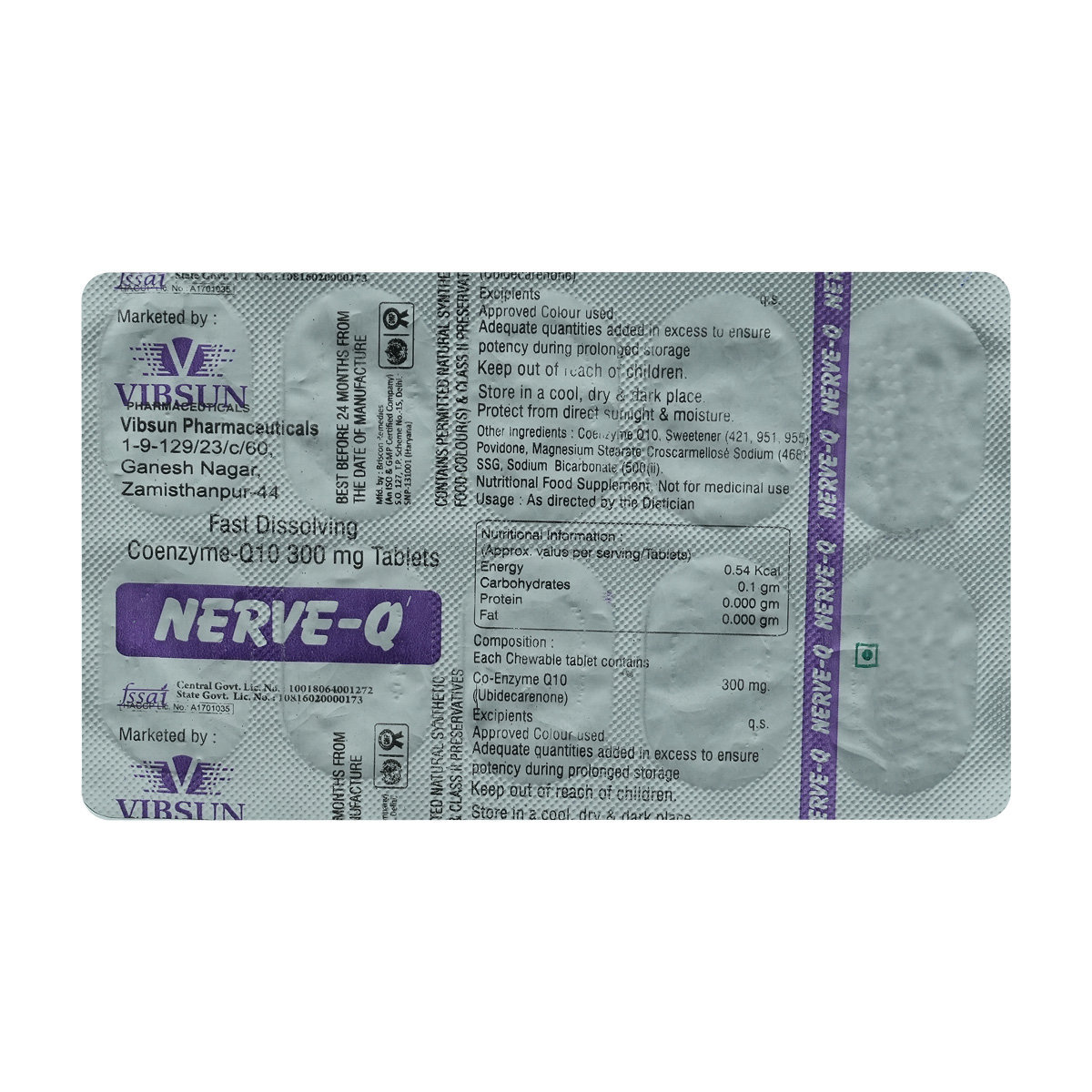- Home
- Qzest Forte Tablet
Qzest Forte Tablet Substitute
Qzest Forte Tablet Substitute
Medicine Composition:
COENZYME Q10-300MGAll Substitutes & Brand Comparisons
RX
Jq Max 300 Tablet 10's
Maxamus Pharma Pvt Ltd
₹533.5
(₹48.02 per unit)
57% CHEAPERRX
Quorex Q 10 300 Tablet 10's
Trustcare Surgitech Solutions Pvt Ltd
₹533
(₹53.3 per unit)
52% CHEAPERRX
Vitaco-Q 300 Tablet 10's
Vitacare Pharma Pvt Ltd
₹656
(₹59.04 per unit)
47% CHEAPERRX
Q DT 300 Tablet 12's
Alka Pharmaceuticals
₹854
(₹64.05 per unit)
43% CHEAPERRX
Coqueen 300 mg Tablet 10's
East West Pharma India Pvt Ltd
₹770
(₹69.3 per unit)
38% CHEAPERRX
Ceq 300 mg Tablet 10's
Zybax Pharmaceuticals
₹700
(₹70.0 per unit)
37% CHEAPERRX
Nerve-Q Tablet 10's
Vibsan Pharmaceuticals Pvt Ltd
₹791.5
(₹71.24 per unit)
36% CHEAPERRX
Out of StockSQ 300 mg Tablet 15's
S S Health Care
₹1250
(₹75.0 per unit)
33% CHEAPERRX
Shelgain Q 300 mg Tablet 10's
Tms Tulsi Medsciences Pvt Ltd
₹872
(₹87.2 per unit)
22% CHEAPERRX
Cq-300 Tablet 10's
Houston Scientific
₹978.5
(₹88.08 per unit)
21% CHEAPERRX
Out of StockDari-Q 300 Tablet 10's
Daris Biocare
₹970
(₹97.0 per unit)
13% CHEAPERRX
Out of StockUniqlo-300 Tablet 10's
Kaps Three Life Sciences Pvt Ltd
₹978.5
(₹97.85 per unit)
13% CHEAPER

When Should You Consider Switching from Qzest Forte Tablet ?
Patients may explore substitutes in the following scenarios:
- High monthly cost of Qzest Forte Tablet
- Non-availability in local pharmacies
- Generic recommendation by a doctor
- Side effects or better tolerability with alternatives
What to Know Before Switching
Before you switch from Qzest Forte Tablet to another medicine, here are some important points to keep in mind:
Same salt, different brands:
Most substitutes contain the same active ingredient - COENZYME Q10-300MG, but the fillers, coating, or manufacturing quality may vary slightly.
Consult your doctor first:
Even if the salt is the same, your doctor can confirm if the substitute is right for your condition, dosage, and health history.
Watch out for allergies or reactions:
Some people may react differently to certain brands due to inactive ingredients. If you notice any side effects, inform your doctor immediately.
Price ≠ effectiveness:
A lower-priced substitute doesn't mean it's less effective. Many generic medicines work just as well as branded ones.
Check the dosage form and strength:
Always match the substitute’s strength (e.g., 5mg, 10mg) and form (tablet, capsule, syrup) with what your doctor prescribed.
Uses
Qzest Forte Tablet is used in the treatment of Coenzyme Q10 deficiency. The detailed uses of Qzest Forte Tablet are as follows:
- Heart Health: Qzest Forte Tablet supports heart muscle function and may reduce symptoms of heart failure.
- Migraine Relief: Qzest Forte Tablet can reduce the frequency and severity of migraines.
- Diabetes Management: Qzest Forte Tablet may improve insulin sensitivity and reduce oxidative stress.
- Coenzyme Q10 deficiency: Qzest Forte Tablet is used in the treatment of Coenzyme Q10 deficiency.
Medicinal Benefits
Qzest Forte Tablet belongs to the class of medications called nutritional supplements used to treat various complications or long-term diseases due to Coenzyme Q10 deficiency. Qzest Forte Tablet may also be used to prevent migraine headaches, reduce the risk of a second heart attack, lower blood pressure, or slow the progression of early Parkinson's disease. Qzest Forte Tablet may also be effective in improving symptoms in people with macular degeneration, congestive heart failure, nerve problems caused by diabetes, or muscular dystrophy. Qzest Forte Tablet has antioxidant properties and prevents tissue damage, helps fight oxidative stress, slows down the effects of ageing, protects cognitive health, and improves metabolic functions and heart health. Qzest Forte Tablet helps provide essential nutrients, thereby helping treat nutritional deficiency.
FAQs
The substitutes of Qzest Forte Tablet contain the same active salt(s) - COENZYME Q10-300MG. However, they may differ in price, manufacturing quality, and inactive ingredients. Speak to your doctor to find a suitable option.
Switching to a generic substitute medicine in the place of Qzest Forte Tablet is often possible if it has the same salt, strength, and dosage form. But always check with your doctor before making any changes to your medication.
Generics versions of Qzest Forte Tablet are typically more affordable because they don’t include the original brand's research, development, and marketing costs. They contain the same active ingredient and are approved for safety and effectiveness.
Most people don’t notice any difference. However, some may react to different fillers or coatings. If you notice any unusual symptoms after switching, consult your doctor.
Make sure the new medicine has the same active salt, strength, dosage form. Always confirm the change with your doctor or pharmacist.
Substitutes of Qzest Forte Tablet meet the same safety and efficacy standards as Qzest Forte Tablet , but small differences in absorption or formulation can exist. A doctor can help you choose the right one for your needs.
Yes. Substitutes of Qzest Forte Tablet may vary in color, size, or shape due to differences in manufacturing and branding, but this does not affect how they work.
Yes, it’s generally safe to switch between multiple substitutes of Qzest Forte Tablet if they have the same salt and strength. However, always inform your doctor so they can monitor how your body responds.
Yes, many people safely use substitutes of Qzest Forte Tablet for long-term treatment. Just ensure it’s done under medical supervision.
If your symptoms stay under control or lab results remain stable, the substitute for Qzest Forte Tablet is likely working well. Regular follow-ups with your doctor are important.
Absolutely. Even with the same salt, small differences can affect how your body responds when switching from Qzest Forte Tablet to its substitute. Always consult your doctor before switching.
Qzest Forte Tablet belongs to the class of medications called nutritional supplements used to treat various complications or long-term diseases due to Coenzyme Q10 deficiency.
Qzest Forte Tablet has antioxidant properties and prevents tissue damage, helps fight oxidative stress, slows down the effects of ageing, protects cognitive health, and improves metabolic functions and heart health.
Coenzyme Q10 is the only fat-soluble antioxidant that our body can produce. It is present in all the cells of our body, and its production is controlled by the same pathway that controls cholesterol synthesis. Coenzyme Q10 is present in many animal protein sources, vegetables, fruits and cereals. Animal hearts and livers represent the richest sources.
Two major contributing factors to a Coenzyme Q10 deficiency are age and the use of statins. As we get older, our ability to naturally produce Coenzyme Q10 decreases. Statins can inhibit the body's natural production of Coenzyme Q10 during use. Statins block cholesterol synthesis, which is a key step for Coenzyme Q10 biosynthesis, and therefore, it has been linked to a reduction in Coenzyme Q10 levels in the body.
While everyone is different, people with a deficiency in Coenzyme Q10 levels often experience physical fatigue and muscle weakness, even while undertaking relatively non-strenuous physical activities, such as walking. Low Coenzyme Q10 levels can also cause mental fatigue, characterised by symptoms such as difficulty concentrating and memory lapses.
Buy best Nutrition & Metabolism products by
OTHER SUPPLEMENTS
HEMATINICS
BONE & JOINT SUPPLEMENTS
WOMEN HEALTH SUPPLEMENTS
GASTRIC DISORDERS SUPPLEMENTS
AMINO ACID SUPPLEMENTS
IMMUNE HEALTH SUPPLEMENTS
WEIGHT LOSS AND WEIGHT GAIN
CARDIAC SUPPLEMENTS
VITAMINS AND MINERALS
DIABETICS SUPPLEMENTS
RESPIRATORY DISEASE SUPPLEMENTS
APPETITE SUPPRESSANTS
NUTRITIONAL SUPPLEMENTS
La Renon Healthcare Pvt Ltd
Alniche Life Sciences Pvt Ltd
Fourrts India Laboratories Pvt Ltd
Intas Pharmaceuticals Ltd
Mankind Pharma Pvt Ltd
Abbott India Ltd
East West Pharma India Pvt Ltd
Sanatra Healthcare Ltd
Vasu Organics Pvt Ltd
Eris Life Sciences Ltd
Leeford Healthcare Ltd
Koye Pharmaceuticals Pvt Ltd
Aristo Pharmaceuticals Pvt Ltd
Elder Pharmaceuticals Ltd
Lyceum Life Sciences Pvt Ltd
Macleods Pharmaceuticals Ltd
Aarux Pharmaceuticals Pvt Ltd
Alkem Laboratories Ltd
Gh Vision Care Life Sciences
Intra Life Pvt Ltd
Linux Laboratories Pvt Ltd
Olcare Laboratories Pvt Ltd
Venera Pharma
Akumentis Healthcare Ltd
Cadila Healthcare Ltd
Capital Pharma
Emcure Pharmaceuticals Ltd
Hetero Healthcare Pvt Ltd
Meyer Organics Pvt Ltd
Prevego Healthcare & Research Pvt Ltd
Sun Pharmaceutical Industries Ltd
Tricept Life Sciences Pvt Ltd
Ajanta Pharma Ltd
Albert David Ltd
DR Johns Lab Pharma Pvt Ltd
Gynofem Healthcare Pvt Ltd
Msn Laboratories Pvt Ltd
Ponoogun Healthcare Pvt Ltd
Truhealthy Llp
Ardent Life Sciences Pvt Ltd
BSA Pharma Inc
Brio Bliss Life Science Pvt Ltd
Converge Biotech Pvt Ltd
Jupiter Biolabs Pvt Ltd
Olympus Therapeutics Pvt Ltd
Syndicate Life Sciences Pvt Ltd
Tas Med India Pvt Ltd
Zydus Cadila
Astrum Healthcare Pvt Ltd
Biological E Ltd
Butson Biosciences
Chemo Healthcare Pvt Ltd
Cipla Ltd
Dr Reddy's Laboratories Ltd
Fresenius Kabi India Pvt Ltd
Innovcare Life Sciences Pvt Ltd
Mediart Life Sciences Pvt Ltd
Medley Pharmaceuticals Ltd
Micro Labs Ltd
Modi Mundipharma Pvt Ltd
Rhine Biogenics Pvt Ltd
Steris Healthcare
Unipark Biotech Pvt Ltd
Yuventis Pharmaceuticals
Zee Laboratories Ltd
Zydus Healthcare Ltd
Aggrowin Pharma
Alembic Pharmaceuticals Ltd
Bioceutics Inc
Celera Pharma Pvt Ltd
Daris Biocare
Edence Life Sciences Pvt Ltd
Femura Pharmaceuticals Pvt Ltd
Genix Lifescience Pvt Ltd
Gladstone Pharma India Pvt Ltd
Hymax Healthcare Pvt Ltd
Indoco Remedies Ltd
Inex Medicaments Pvt Ltd
Ipca Laboratories Ltd
Larivin Pharma Pvt Ltd
Maxamus Pharma Pvt Ltd
Menschlich Healthcare (Opc) Pvt Ltd
Neiss Labs Ltd
Sherim Squibss Pharmaceuticals
Solarium Pharmaceuticals
Torrent Pharmaceuticals Ltd
Winmark Healthcare Pvt Ltd
Adonis Phytoceuticals Pvt Ltd
Alteus Biogenics Pvt Ltd
Aurel Biolife
Axonav Pharma Pvt Ltd
British Biologicals
Cnx Health Care Pvt Ltd
Corona Remedies Pvt Ltd
Esper Lifescience Pvt Ltd
Estragen Pharma Pvt Ltd
Glenmark Pharmaceuticals Ltd
Himerus Medical Solutions Llp
Hospimax Healthcare Pvt Ltd
Jagsam Pharma






